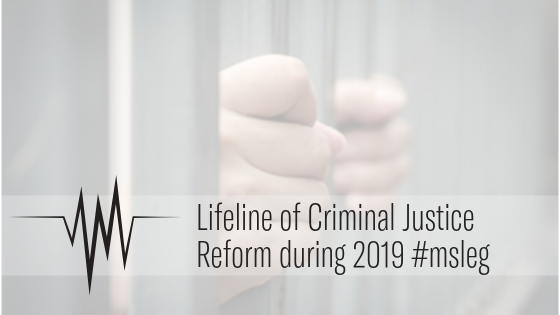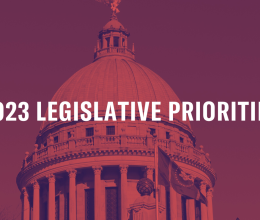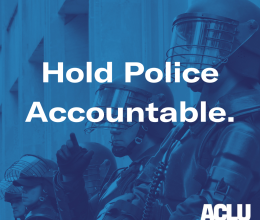By Zakiya Summers, Director of Communications & Advocacy
Mississippi leaders took a step forward in criminal justice reform with House Bill 387 during the 2018 session. We applauded the effort, but we knew that much more work needed to be done. We began to lay the groundwork to compel state leaders to continue efforts that help bring more justice back into the criminal legal system.
In September 2018, we released the Blueprint for Smart Justice, which provided the state of the criminal legal system in Mississippi and provided some needed reforms to reduce the jail and prison population by 50% while also reducing racial disparities. Mississippi ranks 3rd with the highest incarceration rate in the nation. Black men make up 65% of the male prison population
We were excited to be invited to the Criminal Justice Reform Summit hosted by Governor Bryant and fwd.us because it showed great bi-partisan interest in putting forth measures during the 2019 session that would continue strides forward. The governor’s support for the federal First Step Act made us feel secure that he would not hold up efforts that save taxpayer dollars, promote public safety, and deprioritize incarceration as a sentencing option. After all, the state is spending $350 million in corrections cost.
Meanwhile, we developed the Coalition for Smart Justice, a diverse coalition of like-minded organizations centered on a collective effort to reduce the use of pretrial detention and to eliminate wealth-based incarceration. Our target: bail reform.
Based on our analysis of state corrections data, we found that 14 out of 25 individuals held in county jails across Mississippi have not been convicted of a crime. They are languishing behind bars because they can’t afford bail. The inability to pay bail puts individuals at risk of losing their jobs, their home, their family, and even their lives. Right before the holidays, Lanekia Brown, charged for a nonviolent offense in Madison County, died after sitting 27 days in jail on a $1 million bail. She was four weeks pregnant. Her story and the data exemplified the need to take a front-end approach. It is important that we keep people out jail in the first place who pose no risk to society.
The whole purpose of bail is to secure appearance in court, not to punish those too poor to pay for their freedom. So, we aggressively advocated for bail reform in the form of HB 949 and 1081. Both bills were killed in committee. Yet, we know that a bill is never dead until SINE DIE.
HB 1352 includes bail reform…sort of
Through many talks and hours upon hours of meetings and negotiating, we were able to convince legislators to amend HB 1352 to include bail language. What came out of conference, however, was a much more diluted form of bail reform.
HB 1352 gives discretionary power to judges to determine how bail is set. So, the legislation may allow people charged with misdemeanors to avoid jail time because of the inability to afford bail, but it includes several requirements before they can be released on their own recognizance, and does not make provision for an ability to pay hearing. This is especially problematic because without a standard procedure, bail could be implemented in a way that does more harm than good.
House Bill 1352 – the Criminal Justice Reform Act - is reentry reform. It removes certain barriers that make it harder for people to return to the community after leaving the prison system. It is good legislation, but here again, it is limited to people already incarcerated.
Here are some of the pros of the bill:
- Expands the state’s drug court system into intervention courts that provides mental health, veterans support, and other types of drug interventions.
- Eliminates mandatory suspension of driver’s licenses over control substance violations unrelated to driving a vehicle and for unpaid fines and fees.
- Stops the practice of not allowing people with drug convictions to receive workforce training and nutrition assistance.
- Extends time from 30 days to 60 days to allow people released on parole or probation more time to find a job before they must start paying supervision fees.
- Allows judges to help more people get old convictions removed from their records.
However, HB 1352 will still require individuals to pay off all fines and fees associated with convictions before those offenses can be expunged from criminal records. In addition, individuals only get one expungement, although it can be used for multiple offenses tied to one event.
Let’s be clear: HB 1352 will not reduce Mississippi’s prison population.
HB 1352 does not include any sentencing reforms. Reducing the amount of time people serve, even by just a few months, can lead to thousands of fewer people in Mississippi’s prisons.
The bottom line is that if Mississippi really wants to be the leader on criminal justice reform, state leaders must include reforms that help drive down our state’s prison and jail population to include bail, sentencing, and supervision. Re-entry reform is important, but we cannot continue to take a back-end approach and be satisfied without doing something to address the drivers of incarceration.






